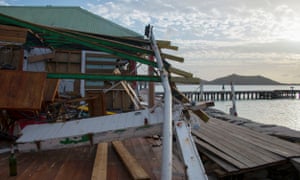
The Caribbean-wide response to Hurricane Irma has been piecemeal and there needs to be a new permanent level of coordination, including better international early warning weather systems, Boris Johnson has said.
The British foreign secretary was speaking at a meeting on the margins of the United Nations general assembly convened by the UK and bringing together British ministers, the French foreign minister Jean-Yves le Drian, the Dutch foreign minister Bert Koenders and leaders from the Caribbean.
Johnson said that “everyone is desperately worried by Hurricane Maria, currently threatening Caribbean islands”. The hurricane has recently strengthened to category four.
The meeting heard that islands such as Anguilla will take as long as two years to recover since it is totally dependent on tourism and the hotel industry is devastated.
In his most self-critical comments yet on the international response to the disaster, Johnson described the operation as “all a bit piecemeal and bit hand to mouth”.
He said: ‘If I am being totally honest, people have been ringing each other up and saying, ‘what can we do’. We don’t need a gigantic new bureaucracy but we do need a smooth way to respond to what is obviously going to be an intensifying pattern of horrific weather events in the Caribbean. What we are trying to build here is a Caribbean recovery plan. We need an automatic recovery system”.
Johnson added: “We still have to deal with Hurricane Maria and we need to get supplies to areas that have not been affected by Irma. They have not had the water proofing, and the plywood. We need to coordinate better in our predictions.”
He said: “We in this region have been living with this reality for some time but we need action now. We have been sitting here talking about the need for infrastructure development. We have been suffering for hurricanes for the last 20 years and up until now we have not been able to put adequate resources immediately to restore these resources. Each of us has literally been left on our own to do it.”Allen Chastanet, prime minister of St Lucia – a former British colony, said the crisis was hitting the whole of the Caribbean, with population movements, agricultural supplies and tourism networks all affected.
He continued: “The vast majority of the islands are in debt in excess of 70% to GDP. The highest expenditure item on our books is interest payments.”
He said the problem could be solved with a stroke of a pen if small developing states did not need to go though multilateral institutions but instead were given bilateral credits.
Chastanet added access to concessionary funds is currently withheld because the islands are classified middle to high income, even although this takes no account of the islands’ vulnerability.
The prime minister also attacked the Commonwealth Development Bank as “an amazing banker, but a horrible economic development agency, and the bureaucracy is too long”.
He said: “[Department for International Development] funds have been available for three years but I do not know of a single project that has gone off the ground, and it is not because there is no urgent need”.
Christos Stylianides, the EU commissioner for humanitarian affairs, told the meeting said climate change knows no borders. The Cypriot politician said: “It is real. It is happening. It is not fake news.”

No comments:
Post a Comment